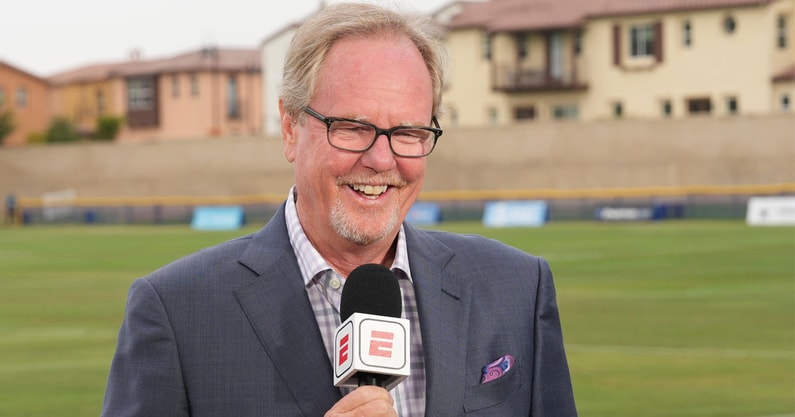Ed Werder reflects on confrontation with Deion Sanders after Colorado's win over TCU

In the aftermath of Colorado‘s shocking takedown of No. 17 TCU over the weekend, coach Deion Sanders made headlines by getting into a bit of a confrontation with long-time ESPN reporter Ed Werder.
Sanders repeatedly asked if he had made Werder a believer now, then told Werder he had “read that bulljunk” that he wrote.
For his part, Werder didn’t much engage with Sanders, instead simply trying to persist in asking a question in the post-game press conference. Sanders ultimately moved on to another reporter’s question.
Werder’s still trying to figure out what happened.
“Well first of all in the moment it just did not seem journalistically appropriate in that situation for me to meet his demand and tell him that I believe in him, whether I do or I don’t,” Werder told Dan Patrick on his show. “And interacting with him as I mentioned over the years, he played for the Cowboys, played for a long time in the NFL as a Hall of Fame player. And interacting as often as we have, I can’t imagine that he really expected that I was going to commit to either position in that circumstance because it was unprofessional to do so.
“Fortunately, he realized it wasn’t going to happen and eventually he moved on without taking my question, because if he was intent on waiting we’d still be there.
“But I don’t understand, why did it matter? In that moment after all he and his sons and his coaching staff and his players had accomplished, why did he think it was so important for me to dismiss my obligations to be fair and objective and commit to Deion so that he would entertain my question?”
The situation certainly didn’t resolve itself in the postgame press conference meeting room, which left several questions on the topic outstanding.
Why was Sanders so intent on making Werder a believer? What did he find objectionable that Werder had written? Why did the scene play out there, after one of the program’s biggest wins in history?
Patrick postulated that the confrontation with Deion Sanders was all a bit of an act from Sanders, a show of sorts aimed at ESPN.
“I don’t know if you’re right. I think it’s entirely possible,” Werder told Patrick. “I also think it is possible that he was overly sensitive to this tweet where I referred to him as a celebrity coach, although I don’t know how he doesn’t think he’s a celebrity. He would be offended if you told him he was not a celebrity, wouldn’t he?”
Top 10
- 1Breaking
Coaches Poll shakeup
New Top 25 after wild Saturday
- 2Hot
Coaching Carousel Intel
Latest at UF, VT & more
- 3New
Playoff Projection
Predicting full 12-team bracket
- 4Trending
AP Poll Projection
Massive shakeup on deck
- 5
Kirby Smart
UGA HC still crushing opponents
Get the Daily On3 Newsletter in your inbox every morning
By clicking "Subscribe to Newsletter", I agree to On3's Privacy Notice, Terms, and use of my personal information described therein.
Werder explained the tweet he thought Sanders might have been referring to as ‘bulljunk.’
“I asked him, as you heard multiple times, what did I write?” Werder said. “And he couldn’t ever provide an example, and the reason is no such example exists. I’ve been doing television for the last 30 years. I’m almost exclusively a TV reporter, as you know.
“Now I am active on social media, and some people have pointed to a Twitter post I had in March in which I said this exactly: ‘Colorado’s celebrity football coach has made CUBuffs football the most interesting program in the country. It’s No. 2 in merchandise sales. Folsom Field suites are sold out and season ticket renewal rate stands at 97%. Deion Sanders has created attention before his first win.’ How does that somehow make me a doubter?”
Werder offered one other potential explanation for the confrontation with Deion Sanders.
He posited that perhaps Sanders is one of several who have become overly reliant on positive viewpoints expressed by former players or coaches in the media.
“I think one of the things, sadly, that’s happened in the media business now and I think it plays into this type of reaction is you can almost argue there are more former athletes in the media now than actual professional reporters,” Werder saiid. “So these players have a tendency I think to praise one another, whether deserved or not. And so that leads to the situation like this if he’s referring to my tweet, where somebody sees something that’s not overwhelmingly positive and instead it feels negative in the context that they’re used to. If that tweet is what set him off then maybe you’re right, maybe it was more who I was working for.
“Although as I mentioned, I’ve covered Deion for a long time and we’ve had a complicated history. We’ve had moments where we got along great and he helped me do my job and consented to sit-down interviews. And we’ve had moments where it wasn’t so wonderful. During the Terrell Owens situation he asked as a commentator for the NFL Network at the time, why couldn’t I be the one who was lying instead of T.O. being the one who was lying?”
In any case, because of Werder’s traditional job responsibilities, the confrontation with Deion Sanders will likely fade fairly quickly. The two aren’t likely to be in a situation where they’d cross paths again soon, unless ESPN decides to assign Werder some more college football work.